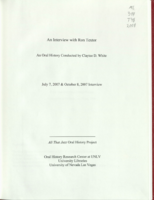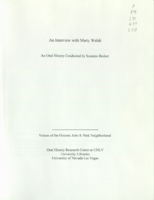Search the Special Collections and Archives Portal
Search Results

Transcript of interview with Bruce Isaacson by Barbara Tabach, March 24, 2017
Date
Archival Collection
Description
Bruce Isaacson was born in 1956 in Castro Valley, California to Betty Griffin and Bernard Isaacson, and spent his childhood in Oakland. He received his bachelor?s degree from Claremont McKenna College with majors in economics as well as drama, and continued studying for his Masters of Business Administration at Dartmouth College. After receiving his MBA, Isaacson started a career in finance, focusing on mergers and acquisitions. In 1995, he moved to Las Vegas to pursue a real estate career alongside his father. In June 2015, Isaacson became Clark Country?s first poet laureate to encourage poetry as an art form in Southern Nevada. Although Isaacson began writing poetry at a young age, he wanted to develop his craft further. So he attended Brooklyn College for a Masters of Fine Arts and studied with famed poet Allen Ginsberg. Isaacson is known in the San Francisco Bay Area as organizer and poet in the Cafe Babar readings in the 1980s. He is also a co-founder of Zeitgeist Press, where he remains publisher and co-editor. In this interview, Isaacson discusses his childhood and how he maneuvered his career path from finance into poetry. He talks about applying for and serving as the county?s first poet laureate, and describes the programing he?s started in this capacity. Isaacson also speaks about his earlier involvement with Bay Area poetry scene as well as the impact of his Jewish upbringing on his life and his art.
Text

Transcript of interview with Diana Saunders by Barbara Tabach, April 17, 2017
Date
Archival Collection
Description
Diana Saunders was born Diana Salshutz in the Bronx, the northern most borough of New York City. She was raised in a Jewish neighborhood and recalls how her maternal grandparents pickled pickles, tomatoes and other traditional Jewish delicacies for Wolfie?s Deli. By the time she was twelve years old, Diana was bustling through the city to pursue her dream of becoming a professional dancer. Encouraged by her mother Rose?her father Sidney was not as eager for this pursuit?Diana was accepted into High School of Performing Arts in Manhattan. In addition, she was accepted at the School of American Ballet where she studied classical ballet during the leadership of renowned choreographer George Balanchine. Her first professional performance was in the Nutcracker for American Ballet. At the age of seventeen, Diana was on her own, confident in her dancing potential, and eager to study jazz dancing. This led her to Matt Mattox and to her important mentor, Luigi (Eugene Louis Faccuito). In time she was a featured dancer for Steven Lawrence and Eydie Gorm?s show Golden Rainbow. This was soon followed by a position on Sammy Davis Jr.?s television show in the 1960s. Diana also studied musical acting and showed talent for comedic performance. In the 1970s, Diana crossed paths with Las Vegas venues. She relocated to Las Vegas in 1974 when Donn Arden offered her a dancer position in Hallelujah Hollywood at the MGM. She met and married musical theater actor/singer Joe Bellomo, whose career spanned four decades. He passed away of complications of early onset Alzheimer?s in 1996. Always true to her personal mantra?Wake up; Dress up. Show up?Diana maintains a busy schedule. At the time of this of this interview, she is currently a manger of gondoliers at the Venetian. She brings to life that career and also talks about being a part of the former Star Trek Experience at the Las Vegas Hilton. Diana shares stories of long career as a dancer, from substituting in the black dancer line to continued study of dancing with Anglo Moio. She also talks about the AIDS fundraising event Golden Rainbow, having dinner at Rabbi Shea Harlig?s home and observations of local theater.
Text

Transcript of interview with Sharon Walker by Barbara Tabach, October 8, 2014
Date
Archival Collection
Description
Sharon Walker is a real estate investor, retired stockbroker and former loan officer. She was born on December 8, 1949 in Toledo, Ohio, and moved to Las Vegas with her family in 1963, where they started Walker Furniture, a store which they later sold to the Alterwitz family. Sharon's father, Julius Walker, was also in the casino business, becoming an owner of the El Cortez Hotel and Casino with Jackie Gaughan. Her mother, Anne Walker was a founding member of the first local Hadassah, The Women?s Zionist Organization. Sharon continues the family tradition of being active in Hadassah as well as being a Board Member of Jewish Family Service Agency. In November 2014 she was an honoree of Hadassah Leadership. In this interview, Sharon describes her adolescence in Las Vegas and the differences in culture as compared to her childhood in Toledo, Ohio. She also recalls the Walker Furniture business, her father?s careers, and her uncles Ed ?E? Walker and Lou ?Paddock? Walker.
Text

Transcript of interview with Robert Brown by Ian McLaughlin, February 23, 1981
Date
Archival Collection
Description
Text

Transcript of interview with Rowena Gonzalez by Michael Boyd, March 1, 1977
Date
Archival Collection
Description
On March 1, 1977, Michael Boyd interviewed Rowena Gonzalez (born 1946 in Wichita Falls, Texas) about her life in Nevada. Gonzalez first talks about her family background and residential history before discussing the way of life in Texas and eventually in Las Vegas. Several topics covered in the interview include Gonzalez’s recollections of the atomic testing, the building of the Hoover Dam, and Howard Hughes. The two also discuss tourism, the properties on the Strip and in Downtown Las Vegas, and early means of transportation.
Text

Transcript of interview with Lomie Heard by Stephen Singer, February 9, 1980
Date
Archival Collection
Description
On February 9, 1980, collector Stephen M. Singer interviewed schoolteacher, Lomie Heard (born January 22nd, 1906 in Carlsbad, New Mexico) in her home in Las Vegas, Nevada. This interview covers education over the span of thirty years, and includes an overview on the building of the University of Nevada Las Vegas. Also discussed during this interview: Nellis Air Force Base, jet airplanes at Nellis, military families, and the Nevada Test Site.
Text

Transcript of interview with Dr. John Shepherd by Lisa Gioia-Acres, November 21, 2008
Date
Archival Collection
Description
Dr. John Richard Shepherd shares the background of his early life in southern Illinois, his father's and grandfather's occupations, and his educational journey through college and medical school. His army experiences in Chicago and Alabama convinced him and his wife to look for a warm dry climate in which to live, and they relocated to Las Vegas in 1968. Dr. Shepherd recalls the businesses and housing surrounding Sunrise Hospital, the difficulties getting his specialty listed in the phone book, and renting his first office space from Nate Adelson. He also describes taking out a loan to install ophthalmology equipment, hiring an office manager with medical accounting experience, and doing cataract surgery in a way that basically hadn't changed for decades. The passing of the Medicare bill back in 1966 caused Dr. Shepherd's practice to build up quickly. He details the many ways eye surgery changed, including the invention of the intraocular lens and the phacoemulsification procedure. He mentions his and Dr. Shearing's contributions to ophthalmology — better designed lenses and surgical techniques - which they taught to other doctors from all over the country. Dr. Shepherd discusses radial keratotomy, which was a precursor to laser and later LASIK surgery, and describes a lens implant technique he learned in Russia from Dr. Fyodorov. He goes on to share anecdotes and stories of his interactions with patients, his travels as a consultant and as a surgical teacher for Project Orbis, and meeting Fidel Castro. He speaks candidly about his successes and his failures as well. Dr. Shepherd retired in 2006 and immediately enrolled in a Master's program and earned a degree in military history. After a long and distinguished career, after receiving many accolades and awards, he and his wife are enjoying life, splitting their time between Sun Valley, Idaho, and Las Vegas.
Text

Transcript of interview with Ron Textor by Claytee White, July 24, 2007 & October 8, 2007
Date
Archival Collection
Description
Ron Textor grew up in Kirksvile, MO shortly after moved to Flint. MI; father was a doctor and mother a school teacher; started piano lessons at 5 and trombone at 8; attended classes at the Stan Kenton clinics at Michigan State University; National Stage Band Camp at Cleveland at the Western Reserve University; started own band at age 14 in Flint, MI; graduated high school in 1965; went to Central Michigan University graduated in 1969 with a bachelor's in music; 1972 released from the army and joined the Glenn Miller Orchestra under Buddy DeFranco; trumpet player Tom Snelson — Phantom of the Opera; The Airmen of Note; Colorado Springs Symphony Orchestra; recording at RCA Victor in Tokyo; 50 weeks a year of one-nighters; St Regis Roof in New York City; book by George Simon on Glenn Miller; Medina Ballroom; traveling by bus; rehearsal with Frank Sinatra; master's degree from Central Michigan; taught college at Michigan, Central, and Alma College; Mott Community College; moved to Wisconsin and taught at Mount Scenario College in the late 70 s; General Motors; Genesee County Fine Arts Council; CETA; Detroit Montreux Jazz Festival; 1981 Montreux Switzerland Jazz Festival; North Sea Jazz Festival at the Hague in Holland; move to Las Vegas 1981.
Text

Transcript of interview with Marty Walsh by Suzanne Becker, July 19, 2007
Date
Archival Collection
Description
In 2002, Marty Walsh and her husband purchased a home in the John S. Park Neighborhood. Three aspects attracted them to their 1941-built home: the quality construction; the aesthetics and details of the house; and the "old-fashion human element" that she associated with her grandparents. Marty describes their relocation to Las Vegas after living for nine years in Ireland and her joy of discovering the John S. Park community. For her there is a neighborliness that they found in the form of the Neighborhood Watch. She feels the neighborhood still has work to do, but the gentrification has had splendid results as new "urbanites" replace original homeowners. From her artist point of view, she also provides thoughts about the impact the artist community of musicians, painters, and creative artists has had on the neighborhood. Even though she is relatively new to Las Vegas, she is well researched in the historic aspects of John S. Park location: once a fertile plot of land where
Text

Transcript of interview with Jim Marsh by Claytee D. White, June 5, 2012
Date
Archival Collection
Description
Jim Marsh in Denver, Colorado. Father was the chief for the Colorado Patrol. Mother lived in Nebraska. Jim split time in both places while growing up. He was a service member of the Army and once getting out of the service he started his work with his father at a Ford dealership. Jim went on to work and own dealership in several different areas, Colorado, California, New Mexico, and Washington states before arriving in Las Vegas, NV in 1971. Once arriving in Las Vegas Marsh purchased a dealership called American Auto Mart. Around 1976 Jim Marsh bought the Santa Fe Saloon along with the twenty lots surrounding it for 12,500. This was his first experience in the gaming industry Marsh was the only dealership in the world for 25 years to have a gaming license in a new-car dealership. Marsh discovered interest in Belmont when there was a lone resident Rose Walter. The two bartered and Jim gained land in Belmont and went on to build a bar and church for the town. Marsh eventually went on to own the Skyline Casino. Jim Marsh founded the Nevada Auto Auction in 1987 on Las Vegas Boulevard South Eventually sold it and used the investment to build the Longstreet Casino. Marsh was' also a member of business organizations, Better Business Bureau and The Red Cross Marsh has been a member of the Salvation Army Advisory Board for at least 25 years. Tonopah is another location that Marsh has invested in. After leasing the gaming at the Mizpah Hotel to later buying the Valley Bank building and moving the gaming from Mizpah. It is still successful today. He also purchased the Tonopah Station House which is a hotel bar, and restaurant; along with owning the grocery store Scolari's next-door. Tonopah has proved to be a very good investment for Jim Marsh.
Text
